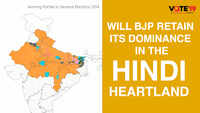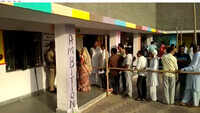A dusty town where urban influx is a bigger issue than polls
Avinash Kamath | TNN | Updated: Apr 17, 2019, 09:01 IST (Right) Internal roads leading to “second homes” have been repaired; (Bottom) Many who have shifted from space... Read More
(Right) Internal roads leading to “second homes” have been repaired; (Bottom) Many who have shifted from space... Read MoreAMBARPADA (SHAHPUR): The transformation of Shahpur is a study in contrast. The dusty town on Mumbai-Agra Highway was once an urban backwater surrounded by hamlets, located about 100km from Mumbai. Today, it presents a bustling sight with hotels, educational institutions, and ‘second home’ housing projects set amidst the sleepy calm of the semi-arid countryside.
What’s driving the change is connectivity to Mumbai and Nashik which has paved the way for, what some locals call, ‘uneven’ development. One of the largest talukas in Thane district, Shahpur is an assembly seat in the Bhiwandi Lok Sabha constituency.
Gated communities and villas now co-exist alongside clusters of mud huts. Some of these settlements are in the remote interiors on hillocks 20-30km from the highway. A visit to one such village reveals stark contradictions. Top-end SUVs share space on battered roads with autorickshaws and cycles.
Amaan Shaikh and his wife Fozia, successful IT professionals in their 30s, working for an MNC in Andheri, are part of this changing milieu. When their company decided to cut flab, much to their delight, both were asked to work from home in Kharghar. Initial enthusiasm waned when their health deteriorated. “Gazing at computers for hours took its toll. We kept on cursing the travel part but it did keep us fit,” says Amaan.
The couple decided to kick their jobs and move into a bungalow--their second home--in Ambarpada in Shahpur last March and see what life had to offer. When Shaikh’s passion for gardening bore fruit, many of the 250-odd plot holders from the surroundings, who own flats in south Mumbai, sought his help to replicate the success. Today, the couple makes a living planting and tending to fruit and vegetable gardens.
Shaikh drives around town in his shiny red compact SUV with locals who he employs in his business venture. Asked if he will vote, Shaikh says he will take time off to go to Kharghar on April 29 when Mumbai goes to polls. “We are still not sure if we want to settle here. Life is not as easy as it seems,” he says. His bungalow is part of a project located on a hillock, from where rainwater run-off is trapped in tanks; with plot holders increasing, availability of this scarce resource is under question.
This is the same problem faced by villagers who live alongside on the hills. Though the four dams surrounding Shahpur quench the thirst of the Mumbai region, its own inhabitants face a water crunch.
Villagers say local MP Kapil Patil is a rare sight here. But the pace at which internal roads have been repaired over the last couple of months suggests that the administration is bent on showing results.
Youths here do not seem enthused about the polls. But they are in awe of the local MLA, Pandurang Barora of the NCP. “We are happy with his work. But this election will not decide his fate. Fight is between Congress candidate Suresh Taware and BJP’s Kapil Patil. And we are not sure whom to vote,” says one. “Our views matters more during MLA elections,” says another youth.
“We will help Modiji become Prime Minister again. He deserves it. I will vote for BJP,” says a shopkeeper near Ambarpada bus stop.
Dharma Arne runs an unnamed tea stall along the shoddy road that runs through his village near Changyacha Pada “I was born here and this shop has been around for the last 40 years. (Kapil) Patil saab doesn’t come here often. The local MLA has done a lot of work. Once the road is repaired and is well-maintained like the main highway, picnickers will flock once again. It will help my business.” he says with hope in his eyes. He is non-committal when asked if he will vote for the Congress.
Not many agree that the influx of urban migrants benefits them. A villager says the local market now caters to the needs of the well-heeled. “We don’t eat green cauliflower (broccoli) which the local shopkeeper sells, only the second-home wallahs buy it,” he says. Disparities are as much social and cultural as they are economic, creating faultlines which are revealed in everyday conversation.
However, some like Vanita Vishe choose to look at the brighter side. “We work as maids in these bungalows to earn our livelihood. Men earn money working as watchmen, gardeners and driver,” she says, underlining the problems of unemployment and the opportunities presented by change.
What’s driving the change is connectivity to Mumbai and Nashik which has paved the way for, what some locals call, ‘uneven’ development. One of the largest talukas in Thane district, Shahpur is an assembly seat in the Bhiwandi Lok Sabha constituency.
Gated communities and villas now co-exist alongside clusters of mud huts. Some of these settlements are in the remote interiors on hillocks 20-30km from the highway. A visit to one such village reveals stark contradictions. Top-end SUVs share space on battered roads with autorickshaws and cycles.
Amaan Shaikh and his wife Fozia, successful IT professionals in their 30s, working for an MNC in Andheri, are part of this changing milieu. When their company decided to cut flab, much to their delight, both were asked to work from home in Kharghar. Initial enthusiasm waned when their health deteriorated. “Gazing at computers for hours took its toll. We kept on cursing the travel part but it did keep us fit,” says Amaan.
The couple decided to kick their jobs and move into a bungalow--their second home--in Ambarpada in Shahpur last March and see what life had to offer. When Shaikh’s passion for gardening bore fruit, many of the 250-odd plot holders from the surroundings, who own flats in south Mumbai, sought his help to replicate the success. Today, the couple makes a living planting and tending to fruit and vegetable gardens.
Shaikh drives around town in his shiny red compact SUV with locals who he employs in his business venture. Asked if he will vote, Shaikh says he will take time off to go to Kharghar on April 29 when Mumbai goes to polls. “We are still not sure if we want to settle here. Life is not as easy as it seems,” he says. His bungalow is part of a project located on a hillock, from where rainwater run-off is trapped in tanks; with plot holders increasing, availability of this scarce resource is under question.
This is the same problem faced by villagers who live alongside on the hills. Though the four dams surrounding Shahpur quench the thirst of the Mumbai region, its own inhabitants face a water crunch.
Villagers say local MP Kapil Patil is a rare sight here. But the pace at which internal roads have been repaired over the last couple of months suggests that the administration is bent on showing results.
Youths here do not seem enthused about the polls. But they are in awe of the local MLA, Pandurang Barora of the NCP. “We are happy with his work. But this election will not decide his fate. Fight is between Congress candidate Suresh Taware and BJP’s Kapil Patil. And we are not sure whom to vote,” says one. “Our views matters more during MLA elections,” says another youth.
“We will help Modiji become Prime Minister again. He deserves it. I will vote for BJP,” says a shopkeeper near Ambarpada bus stop.
Dharma Arne runs an unnamed tea stall along the shoddy road that runs through his village near Changyacha Pada “I was born here and this shop has been around for the last 40 years. (Kapil) Patil saab doesn’t come here often. The local MLA has done a lot of work. Once the road is repaired and is well-maintained like the main highway, picnickers will flock once again. It will help my business.” he says with hope in his eyes. He is non-committal when asked if he will vote for the Congress.
Not many agree that the influx of urban migrants benefits them. A villager says the local market now caters to the needs of the well-heeled. “We don’t eat green cauliflower (broccoli) which the local shopkeeper sells, only the second-home wallahs buy it,” he says. Disparities are as much social and cultural as they are economic, creating faultlines which are revealed in everyday conversation.
However, some like Vanita Vishe choose to look at the brighter side. “We work as maids in these bungalows to earn our livelihood. Men earn money working as watchmen, gardeners and driver,” she says, underlining the problems of unemployment and the opportunities presented by change.
Download The Times of India News App for Latest Elections News.
Making sense of 2019
#Electionswithtimes
View Full Coverage
































All Comments ()+^ Back to Top
Refrain from posting comments that are obscene, defamatory or inflammatory, and do not indulge in personal attacks, name calling or inciting hatred against any community. Help us delete comments that do not follow these guidelines by marking them offensive. Let's work together to keep the conversation civil.
HIDE